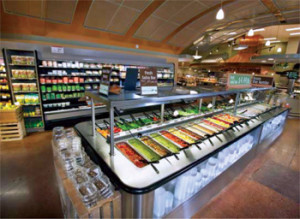Employees of a Park Ridge grocery store will undergo additional training in public health and food safety after the store failed two consecutive inspections last year.
 Mariano’s, which opened in February of last year in the former Dominick’s at 1900 S. Cumberland Ave., was hit with a $100 fine from the Park Ridge Department of Environment Health after the store received a 52 percent score during a routine December inspection. In July, the market’s score was 50 percent.
Mariano’s, which opened in February of last year in the former Dominick’s at 1900 S. Cumberland Ave., was hit with a $100 fine from the Park Ridge Department of Environment Health after the store received a 52 percent score during a routine December inspection. In July, the market’s score was 50 percent.
According to sanitation inspection reports compiled by the city’s environmental health officers, violations involving improper food temperature and inadequate refrigeration largely accounted for the deductions the store received and the ultimate failing grades.
Examples cited in the Dec. 12 inspection report included a pre-made sandwich refrigerator reportedly operating at 62 degrees, well above the 41-degree maximum; a cheese case recording temperatures of 50 degrees for more than one hour; and sliced tomatoes on a prep table measuring 70 degrees.
The food was ordered thrown away, the report stated.
According to the report, a number of hot foods on the store’s buffet bar were not as hot as they should have been because too many items had been piled in the heated containers, cooling off the food on top.
“If you over-stack hot food, it won’t keep at 135 degrees minimum temperature required,” the inspector’s report stated. “I found sausage and chicken below 135 degrees because it was overstocked. The chicken was at 98 degrees, sausage at 106.”
On Jan. 7 of this year, Park Ridge’s health inspectors met with representatives from Mariano’s and Roundy’s Supermarkets Inc. to “clarify the importance of employee training,” said Laura Dee, environmental health officer for the city.
Dee said that while Mariano’s was striving for “high level” customer service and food presentation, employees did not appear to be receiving the right training regarding food temperature and basic hand-washing procedures.
“Employees have to be trained to take their job seriously,” she said. “If it’s 80 percent customer service and only 20 percent food service sanitation, then it has to be balanced.”
